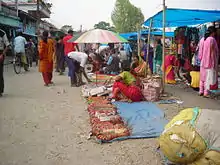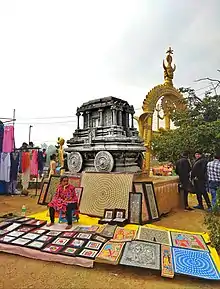Haat bazaar
Haat हाट or hat, even haat bazaar, is an open-air market[1] that serves as a trading venue for local people in rural areas and towns of Indian subcontinent, especially in India, Nepal, Bangladesh and Bhutan.[2] Haat bazaars are conducted on a regular basis, i.e. or that is once, twice, or three times a week and in some places every two weeks. At times, haat bazaars are organized in a different manner, to support or promote trading by and with rural people.[3][4] In addition to providing trading opportunities, haat bazaars serve as meeting places, rural settlements come up around the haats which gradually grow into towns.

Bilateral Haats at international borders
Border Haats of India with neighbouring nations includejointly-run bi-lateral Haats at designated places on India's border with neighbours such as on India–Bangladesh border, India-Bhutan border, India–Myanmar border, and India–Myanmar border.[5]
List of popular Haats by country
India

In India, street vendors legitimately operate under the Street Vendors Act, 2014. Please help expand this partial and alphabetical list.
- Assam
- Gohpur Haat Bazaar at Gohpur in Assam is considered India's largest.
- Delhi
- Dilli Haat in Delhi is a famous permanent market place built in traditional style which is open every day.
- Haryana,
- Gita Mahotsav at Brahma Sarovar in Kurukshetra in Haryana, month long month Haat in Nov-Dec every year.
- Surajkund Haat at Surajkund in Faridabad in Haryana, month long Haat in Nov-Dec every year.
- Odisha
- Ekamra Haat is a permanent marketplace and a landmark famous for its art and crafts market in the capital city of Bhubaneswar.
- West Bengal
- Rampurhat is a municipal town in India that grew around a Haat.
Bangladesh
Two districts Lalmonirhat and Jaipurhat of Bangladesh have the suffix "haat" in their name, undoubtedly reflecting the presence of haat bazaars in those locations around which these cities grew up.
Nepal
Eastern Nepal, most of the towns are named after the weekly haat. Aaitabare, Sombare, Mangalbare, Budhabare, Bihibare, Sukrabare and Sanischare are some common Nepali town names that are named for the day of the weekly haat.
Panchami, Nawamidanda, and Saptami are towns named after the fortnightly haats, according to the Hindu lunar calendar.
See also
- Indian subcontinent
- Other related
- Market (place)
- Palengke in Philippines
- Retail
- Wet market in Singapore
gallery
.jpg.webp) 'The Haat' of Doraguda (The weekly village market of Doraguda, Odisha)
'The Haat' of Doraguda (The weekly village market of Doraguda, Odisha).jpg.webp) 'The Haat' of Doraguda (The weekly village market of Doraguda, Odisha)
'The Haat' of Doraguda (The weekly village market of Doraguda, Odisha)
References
- "Haat". Oxford Dictionary. Archived from the original on July 20, 2012.access date March 2015
- Crow, B., Markets, Class and Social Change: Trading Networks and Poverty in Rural South Asia, Palgrave, 2001, [Glossary] p. xvii
- "Haat". Nepal News.access date March 2015
- "Icimod Haat Bazaar – Showcase, Sell, Share". Icimod.access date March 2015
- Closer economic ties with neighbours vital, The Hindu, 7 May 2019.